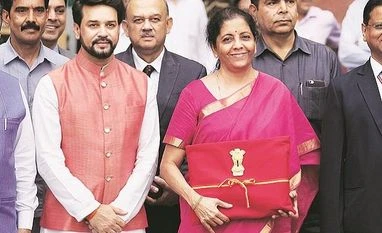Like Saumya, many are glued to the television on Budget day or scan websites and newspapers to find out how this crucial document will impact their lives. Says Naveen Wadhwa, DGM, Taxmann.com: “A layman may not be able to understand too many technicalities. But if he wants something instantly, he should look at the Budget highlights.” The Budget focuses on several aspects that impact citizens directly, such as personal income tax rates.
The Union Budget gives the account of the government's finances for the fiscal year that runs from April 1 to March 31. It gives vital information on the capital budget and revenue budget. The former provides details of government-related capital payment and receipts, while the latter gives information about all the revenue expenditure and receipts. Understanding the budget document is not easy, but if you read it, you will realise it has two parts, A and B.
Part A: This part focuses on the macro aspects of the economy and large-scale plans that impact all the states. For instance, new schemes like Ujjwala Yojana and Saubhagya Yojana were announced last year. Says Ankur Maheshwari, chief executive officer, Equirus Wealth Management: “On the macro-economic side, you should understand the focus area of government spending. If the government announces big infrastructure investments, you could find an opportunity to invest more in infrastructure companies.”
Part B: This is the key part for an individual as it deals with various taxation proposals.
Ordinary taxpayers: The key information for them is in Part B – yes, the income-tax slabs and corresponding rates. Any change in these will directly impact your finances. In the last Budget, the Finance Minister had increased the tax rate for people with incomes of Rs 2-5 crore to 39 per cent, and of those with incomes of Rs 5-10 crore to a whopping 42.71 per cent. Effectively, the rates rose by 3.12 per cent and 6.8 per cent for taxpayers in these two brackets. Given that consumption has been hit significantly during the past year, the government may try to soften the blow for some categories of taxpayers.
In September, there was a tax cut on the corporate side. Now, the expectation is getting built up that there will be some tinkering with personal tax slabs, the idea being that more disposable surplus in the hands of individuals will lead to higher consumer spending.
Senior citizens: They look for new schemes especially designed for them, in terms of social security, retirement, exemption on interest income, and so on. Says Maheshwari: "It will be immensely helpful if interest income from annuities, which many retirees buy to maintain regular monthly cash flow, is exempted from taxation."
There are chances that the Finance Minister may increase the basic exemption limit for senior citizens from Rs 3 lakh to Rs 5 lakh. Says Ashok Shah of N A Shah Associates LLP: “If this happens, their compliance burden will come down and it will put them at par with a super senior citizen who is 80 years and above.”
Investors: Investors should look forward to moves on long-term capital gains (LTCG) and dividend distribution tax (DDT). Says Shah: “Exemption on LTCG on equity shares purchased through the stock exchange or equity-oriented mutual funds should be reintroduced. DDT should be abolished, and dividend should be made taxable in the hands of the investor.”
Traun Birani, founder and director of TBNG Capital Advisors, is of the view that the Section 80C limit of Rs 1.5 lakh should be increased. “Since real estate is going through tough times, there could be some relief to this sector as well,” he says. This means you should watch out for the deduction limit on home loans being increased. The government could also allow a higher deduction on interest repaid on a home loan, which is Rs 2 lakh at present for an individual if the house is self-occupied.
Similarly, the restriction of allowing the loss of Rs 2 lakh from letting out house property due to interest on borrowing could be removed.
Home-makers: There could be some impact from customs and excise duty changes. In Union Budget FY20, custom duties were increased on cashew kernels, tiles, auto parts, marble slabs, optical fibre cable, CCTV camera and some other products. And a five per cent customs duty was imposed on imported books. Such changes might impact the household budget. For wannabe entrepreneurs, there could be schemes or announcements related to various programmes such as MUDRA, Stand UP India and those targeting Self Help Groups (SHGs).
To read the full story, Subscribe Now at just Rs 249 a month
Already a subscriber? Log in
Subscribe To BS Premium
₹249
Renews automatically
₹1699₹1999
Opt for auto renewal and save Rs. 300 Renews automatically
₹1999
What you get on BS Premium?
-
Unlock 30+ premium stories daily hand-picked by our editors, across devices on browser and app.
-
Pick your 5 favourite companies, get a daily email with all news updates on them.
Full access to our intuitive epaper - clip, save, share articles from any device; newspaper archives from 2006.
Preferential invites to Business Standard events.
Curated newsletters on markets, personal finance, policy & politics, start-ups, technology, and more.
Need More Information - write to us at assist@bsmail.in
)